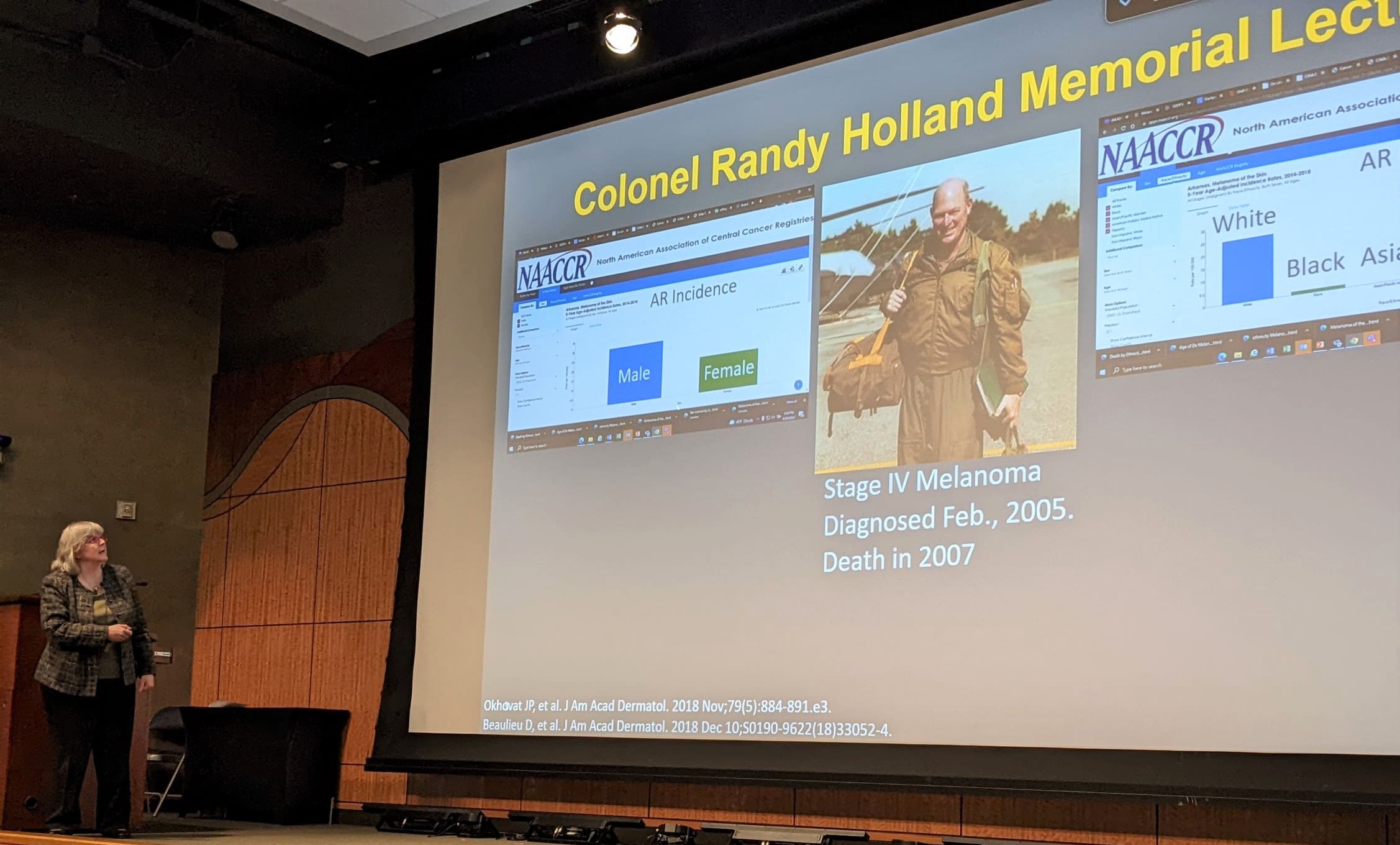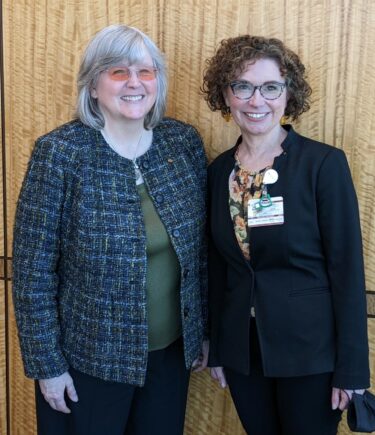View Larger Image

Sancy Leachman, M.D., Ph.D., from Oregon Health and Science University, delivered the Colonel Randy Holland Memorial Lecture on melanoma.
Image by Seth Hooker
Self-Exams, Early Detection Critical in ‘War on Melanoma,’ UAMS Guest Lecturer Says
| May 17, 2022 | The University of Arkansas for Medical Sciences (UAMS) hosted the latest installment of the Colonel Randy Holland Melanoma Lecture Series on May 6, an event that focuses on melanoma awareness, detection, prevention and treatment.

Sara Shalin, M.D., Ph.D., (right), who chairs the Department of Dermatology at UAMS, with guest lecturer Sancy Leachman, M.D., Ph.D.
“Melanoma is the one really lethal skin cancer that you can see with your eyes,” said guest lecturer Sancy Leachman, M.D., Ph.D., from Oregon Health and Science University (OHSU). “That’s why we need to be teaching the public that they can examine their own skin.”
Leachman is chair of the Department of Dermatology at OHSU and director of the Melanoma Program at the OHSU Knight Cancer Institute.
The lecture series, founded in 2008 by his friends and family, honors Col. William “Randy” Holland and the many UAMS physicians, nurses and staff members who treated and assisted him during his battle with cancer.
A lifelong Arkansan, Holland graduated from Sylvan Hills High School and the University of Central Arkansas before enjoying a 42-year career with the Arkansas Army National Guard.
In February 2005, Holland was diagnosed with stage IV malignant melanoma — the cancer had spread (metastasized) throughout his body. As part of his treatment at UAMS, Holland was committed to helping his medical team gain insights that could benefit future patients and improve patient outcomes. After a courageous battle, he died in 2007.
“In the past few years, there have been a lot of developments in therapeutic treatments of melanoma, but we still have a big fight ahead of us,” said UAMS’ Sara Shalin, M.D., Ph.D., who introduced Leachman. Shalin is associate professor and chair of the College of Medicine Department of Dermatology.
“Early detection is a crucial component of that fight,” she said. “When detected before it spreads, melanoma can very often be successfully cured with surgery.”
Leachman is a physician scientist whose research focuses largely on prevention and early detection of melanoma.
“It’s fitting that I would speak at an event honoring a soldier,” Leachman said. “I call my program the ‘War on Melanoma.’ This is a monster we’re fighting against.”
According to graphs that Leachman presented, risk factors for melanoma are dramatically increased by being male, having white skin and being over age 35. That risk is increased if you spend a lot of time outside. If you have a family member that has had melanoma, your risk is doubled. If you have previously had a melanoma, your chance of getting one again increases nine-fold.
For Arkansas specifically, Leachman said that Searcy, Prairie and Saline counties experience the highest rate of new skin cancer cases. Additionally, her presentation showed that Sebastian, Benton and Pulaski counties experience the highest rates of skin cancer deaths.
Leachman also showed that the five-year survival rate of patients is 98% when diagnosed with melanoma locally (when the cancer is limited to the skin). That number drops to 69% when melanoma spreads regionally to the lymph nodes and, despite all of the new treatments that have become available since 2013, detection of distant spread (or metastasis) has a five-year survival rate of just 30%.
Leachman’s “war on melanoma” has many moving parts. What started with just one surgical oncologist and one medical oncologist has morphed into a statewide public health and population science program focused on melanoma early detection. One of the primary strategies is to increase visibility of melanoma in the public eye.
“Our new campaign is social media driven and is called ‘Melanoma Stands Out,’” she said. “It can be found on YouTube, Facebook, and Instagram. The ad links to our website, which shows visitors how to do a self-exam and helps them to know what they’re looking for. If you do find something, the website has a list of all the board-certified dermatologists in your state so that you can easily follow up and get a diagnosis.”
“This is a fight that we can win,” she concluded. “With enough awareness, we can change the world.”